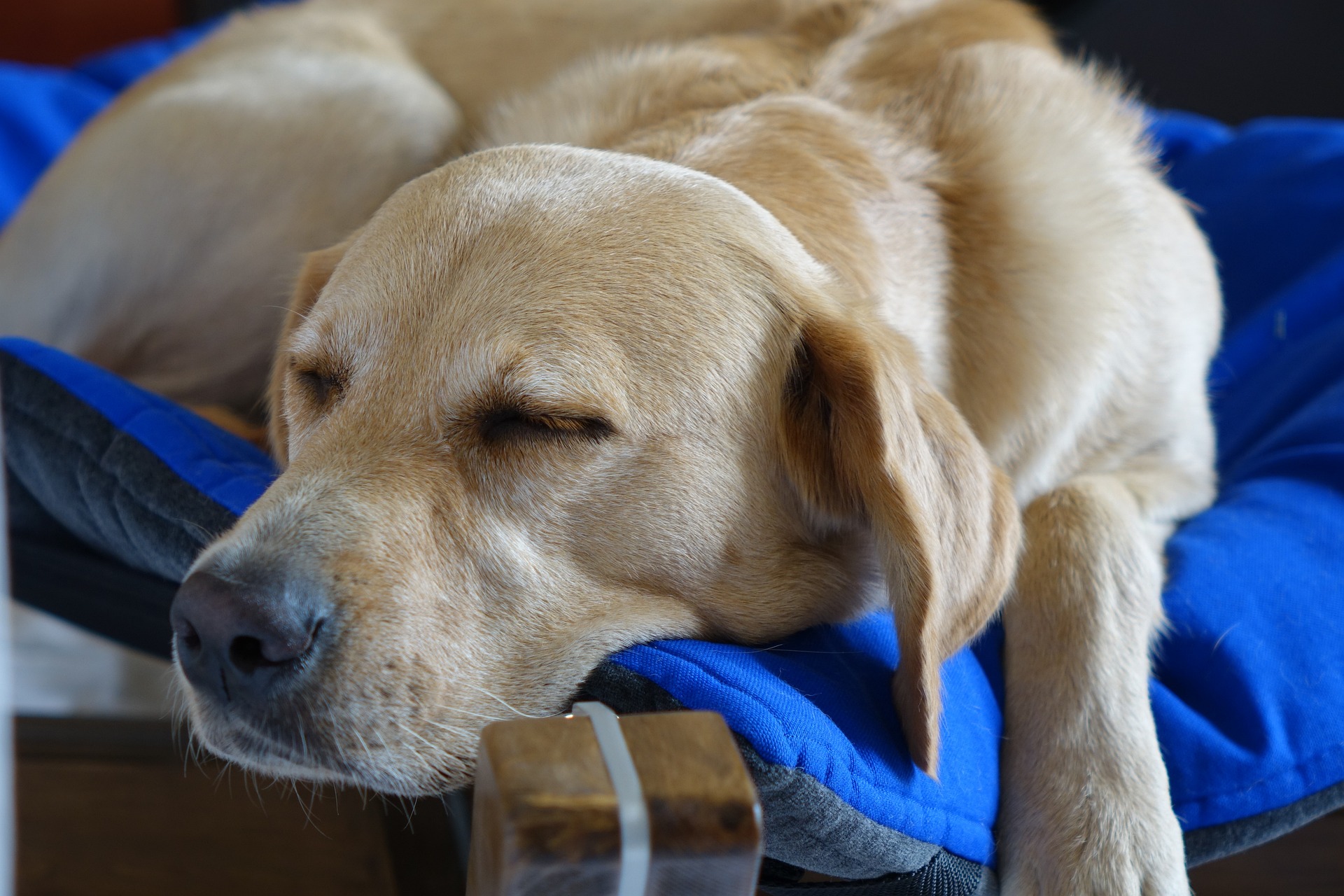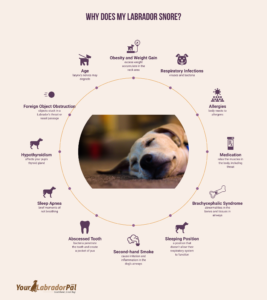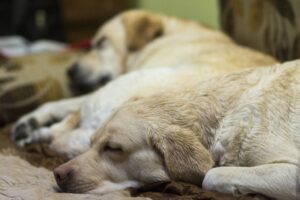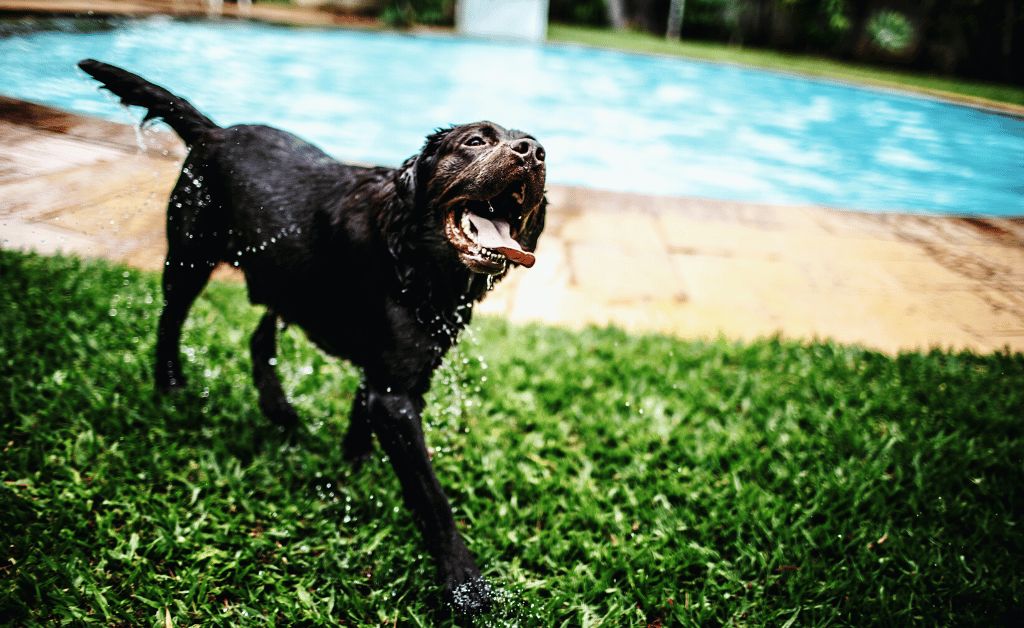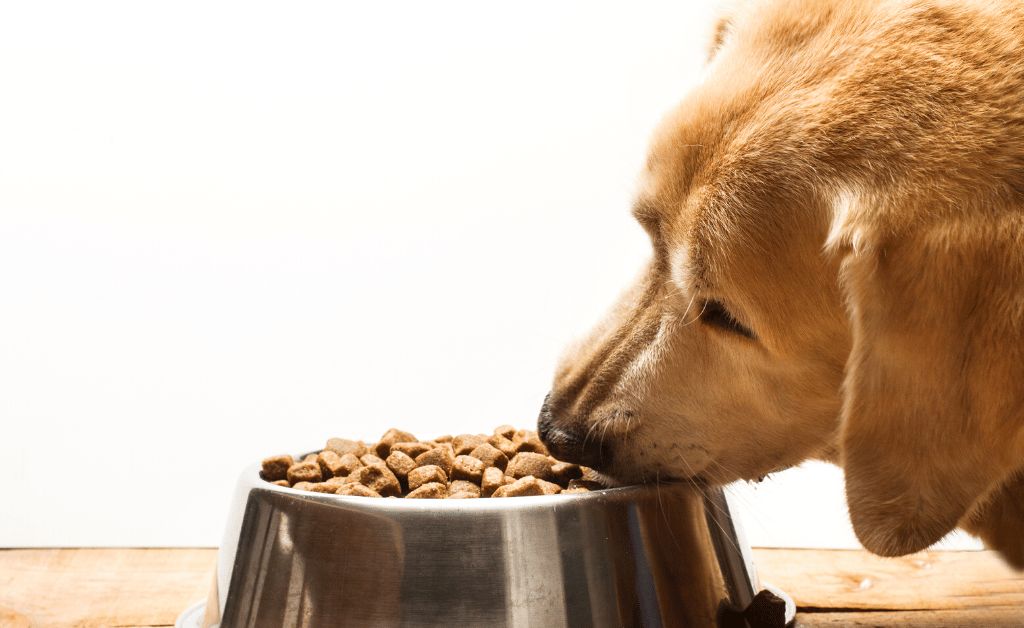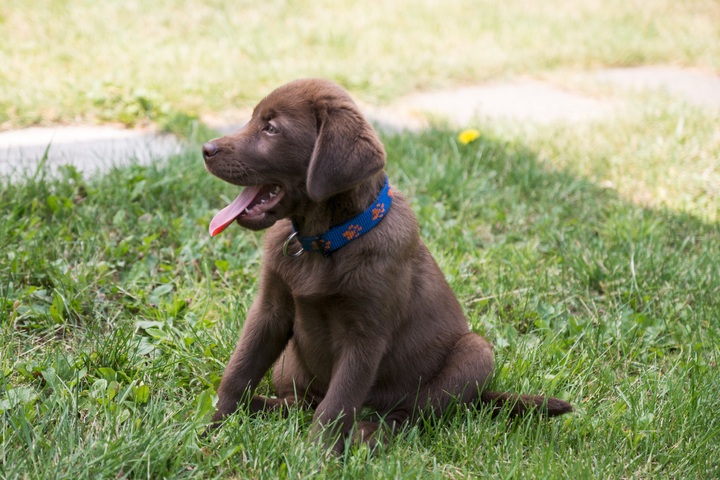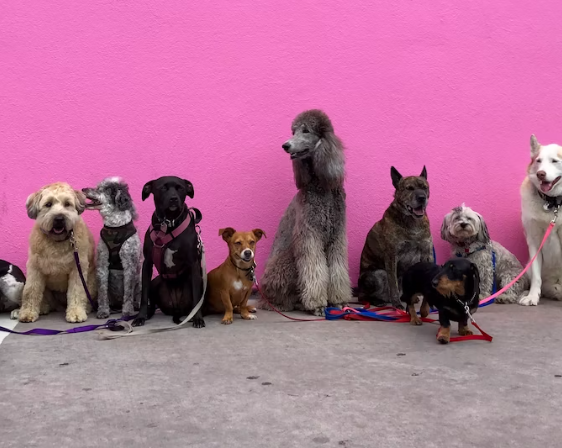Why Does My Labrador Snore?
Picture this: you’re all snuggled up in your cozy bed after a long day, drifting off into dreamland, when suddenly you hear it—a loud, rumbling sound coming from the other side of the room. At first, you might think it’s a train passing by, but then you realize it’s actually coming from your furry companion, your precious Labrador.
That’s right; your pup is snoring. But why does my Labrador snore? Is it just a harmless quirk, or is there something more serious going on?
First of all, let’s establish that it’s actually common for dogs to snore. Just like humans, dogs can snore for a variety of reasons. However, if you notice that your pup is snoring more frequently or louder than usual, it could be a sign of an underlying health issue. In fact, certain breeds, such as French Bulldogs and Pugs, are more prone to snoring and other breathing problems due to their distinct facial structures.
So, while snoring in dogs can be normal, it’s always a good idea to pay attention to your pup’s breathing patterns and consult with your veterinarian if you have any concerns.
Understanding Snoring in Dogs
Similar to how it sounds in people, the soft tissues in the mouth and throat vibrate when a dog snores. The disruption of the dog’s airway’s regular airflow causes the vibration to occur. Sometimes, the reason for this is really straightforward. If your dog is a back sleeper, his tongue may be resting in his airway, causing him to snore.
Numerous different factors can contribute to snoring. If you look closer, you can address the issues and learn how to stop a dog from snoring. For instance, if your dog is overweight, you can alter her eating schedule.
Why Does My Labrador Snore?
As a pet owner, paying close attention to your pup’s snoring patterns is important. If you’re unsure of why your Labrador is snoring, there could be a variety of explanations for it. Therefore, to help you figure out why your pup is snoring, here are some common causes:
Obesity and Weight Gain
Obesity and weight gain in dogs, especially Labradors, can cause them to snore. Yes, you read that right! Now, you might be wondering how obesity and weight gain lead to snoring in Labradors. Let me explain.
When a dog gains excess weight, it may start to accumulate in the neck area, which can put pressure on the airway. This pressure can restrict the airflow and make it difficult for your furry friend to breathe comfortably. The irregular airflow then causes tissue vibration, leading to snoring.
In fact, obesity is a major health concern for Labradors, as they are prone to gaining weight due to their love for food and lack of exercise. Not only does it make them snore, but it also puts them at risk for other health issues like joint problems, diabetes, and heart disease.
Respiratory Infections
Respiratory infections affect the dog’s upper respiratory system, which includes the nose, throat, and trachea. One of the most common respiratory infections that can cause snoring in Labradors is kennel cough. This infection is highly contagious and is caused by a variety of viruses and bacteria.
Other respiratory infections that can cause snoring in Labradors include pneumonia, common colds, bronchitis, and sinus infections. These infections cause inflammation in the respiratory system, making it difficult for the dog to breathe normally. As a result, Labradors tend to breathe loudly and snore while sleeping.
Allergies
When your furry friend’s body reacts to allergens, the nasal passages get inflamed, which leads to congestion. As a result, your dog might struggle to breathe calmly and snore during sleep. Moreover, while sleeping, the dog’s soft palate vibrates, which produces a snoring sound.
In order to reduce the snoring problem in your furry friend, it’s crucial to identify the allergens causing the problem in the first place. Sometimes, allergens, such as pollen, dust mites, or mold, could be present in the dog’s environment. Other times, it could be something they are eating, like dairy products or certain types of meat.
Medication
Some medications are well-known culprits for causing snoring in Labradors. The reason for this is that medication of certain types may relax the muscles in the body, including those in the throat. When these muscles relax too much, they can cause the airway to become narrow, leading to snoring. This is especially true of medications that cause sedation, a calming effect, or those that cause drowsiness.
If you have noticed that your Labrador started snoring after starting medication, then it’s definitely worth discussing with your veterinarian about finding an alternative medication.
Brachycephalic Syndrome
Brachycephalic syndrome is actually quite common in certain breeds of dogs with shorter snouts – like Pekingese, Boston terrier, and shih tzu. This condition is caused by abnormalities in the bones and tissues in their airways, which results in less air flowing through the passages than usual. This causes a lot of strain on their respiratory system, leading to the loud snoring you might have noticed.
Not only is dog snoring a symptom of Brachycephalic syndrome, but dogs with this condition can also experience other issues such as difficulty breathing, coughing, and even fainting in extreme cases.
Sleeping Position
Labradors are prone to snoring because their airways can become obstructed when they sleep. This can happen if they sleep in a position that doesn’t allow their respiratory system to function properly. For example, if they sleep on their back, their tongue and soft palate may fall back and block their airway. Similarly, sleeping with their head too elevated or too low can also cause airflow problems.
Exposure to Second-hand Smoke
If you smoke around your beloved Labrador, their chances of snoring increase. Secondhand smoke can cause irritation and inflammation in the dog’s airways, leading to snoring. In fact, snoring is not the only health issue that can affect dogs exposed to secondhand smoke. They are also at risk of developing lung cancer, allergies, and respiratory infections.
So, it’s not just about their snoring – protecting your furry friend’s overall health and well-being by not smoking around them is important.
Abscessed Tooth
An abscessed tooth is a painful infection that occurs in the teeth and gums of dogs. It happens when bacteria penetrate the tooth and create a pocket of pus. This can be caused by poor dental hygiene, tooth decay, or trauma to the tooth. And when it comes to Labradors, they’re more prone to dental problems due to their love of chewing and eating just about anything they can get their paws on.
But how does this connect to snoring? Well, it can cause the throat to become inflamed and swollen, which can narrow the airway and lead to snoring. Additionally, if your pup is in pain from the infection, it may have trouble sleeping comfortably, and this can also contribute to snoring.
Sleep Apnea
Sleep apnea is a condition where an individual experiences brief moments during their sleep when they stop breathing. In Labrador, this is linked to their anatomy – their short snouts and flattened faces make them more susceptible to this condition. When they experience these moments of not breathing, it causes them to snore loudly to catch their breath.
Hypothyroidism
It might not be the first thing that crosses your mind when you hear your Lab snoring away, but it’s actually a very common cause of snoring in this breed. You see, hypothyroidism is a condition that affects your pup’s thyroid gland, which can lead to many different symptoms, including weight gain, lethargy, and, you guessed it, snoring.
Now, I know what you’re thinking: “What’s a thyroid gland?” Well, it’s a small, butterfly-shaped gland located in your dog’s neck that produces hormones that regulate its metabolism. When the thyroid gland isn’t functioning properly, it can throw off your dog’s entire system, leading to various health issues.
Foreign Object Obstruction
Basically, Foreign Object Obstruction occurs when a small foreign object, like a blade of grass or a piece of food, gets stuck in a Labrador’s throat or nasal passage. This causes the airway to become partially blocked and causes the dog to make loud snoring sounds as they struggle to breathe. It’s not only annoying for you, but it can also be distressing for your furry friend.
Age
As a dog matures, the larynx’s nerves may degrade, weakening the voice box’s muscles and causing it to droop. This restricts airflow, which causes a dog to breathe loudly while dozing. Long-nosed breeds, such as Irish Setters and Labrador Retrievers, are prone to this ailment, also known as laryngeal paralysis.
The vocal cords do not open fully during inhalation in cases of laryngeal paralysis, which results in stridor or noisy breathing. Alterations in barking sounds and coughing after activity or while eating or drinking are symptoms.
Although the illness can often result in asphyxia, this does not necessarily suggest that a dog will live less time. Early detection and treatment, such as sedatives or anti-inflammatory drugs, can lessen any breathing problems.
Home Remedies to Reduce Snoring
Snoring in dogs is a common issue that can disrupt both their sleep and yours. While there are medical treatments available, home remedies can also be effective in reducing snoring in dogs. Not only are these natural remedies cost-effective, but they also don’t have any harmful side effects like some medications.
So, let’s explore some simple and easy home remedies that can help your pooch snooze soundly without the loud snoring!
Adjusting Sleeping Position
One of the easiest ways to reduce snoring is to adjust your pooch’s position simply. That’s right, something as simple as changing the way your Labrador sleeps can make a big difference.
So, what position should your furry friend sleep in to reduce snoring? Experts recommend having your dog sleep on its side instead of its back. Sleeping on their side helps keep their airway open and reduces the likelihood of snoring. You can easily encourage this position by providing a soft and comfortable bed that’s big enough for them to stretch out on.
Clean The Bedding
Over time, your dog’s bedding can become caked with dirt, dust, and dander, aggravating their airways and leading to snoring. So, by washing their bedding regularly, you can help reduce the amount of gunk they’re breathing in and potentially minimize their snoring.
Make sure to use a gentle detergent and avoid any bleach or fabric softeners, as these can be harsh on your dog’s skin. And if your dog has any allergies, consider using a hypoallergenic detergent or even a natural alternative like vinegar or baking soda. With a clean and cozy bed to sleep in, your furry friend may be snoring less in no time!
Use an air Purifier
An air purifier works by cleaning the air in your home and removing any potential irritants that could be causing your dog to snore. This includes allergens, dust, and pollutants that can impact the respiratory system. With cleaner air, your puppy’s breathing will be easier and more regular, reducing the volume and frequency of their snoring.
Plus, an air purifier can also provide other health benefits for both you and your dog. So, if you’re tired of playing second fiddle to your Lab’s snoring, consider investing in an air purifier and see the difference it can make!
Use a Humidifier
A humidifier is one of the easiest and most effective ways to reduce snoring in your furry friend. That’s right, simply adding moisture to the air can help clear their airways and reduce the vibrations that cause snoring.
Using a humidifier can work wonders for your four-legged friend, especially during dry months when the air inside your home can get quite stuffy. The added moisture will help keep their nasal passages lubricated, which can make it easier for them to breathe and prevent snoring. Not to mention, it can also help with other issues such as dry skin and allergies.
Weight Management
I’m not talking about putting them on a fad diet or depriving them of their favorite treats. Consult with your vet to help you develop a sustainable weight management plan for your pup.
Weight management for Labradors can include regular exercise, a healthy diet, and portion control. Shedding off those extra pounds makes their airways less obstruct, leading to less snoring at night. And, let’s face it, who wouldn’t want a fit and healthy pup?
So not only will weight management aid in reducing your Labrador’s snoring, but it will also lead to better overall health and a happier pet. Just remember to consult your vet first before starting any weight management program.
Dental Care
You might be wondering how dental care can help with snoring. Well, dental issues, such as malocclusion (when the teeth don’t fit together properly) or gum disease, can actually contribute to snoring. By ensuring that your Labrador’s teeth and gums are healthy, you can reduce their snoring.
So, what can you do? First, ensure your dog gets regular dental checkups – just like you would for yourself! You can also try brushing their teeth at home, using a soft-bristled toothbrush and toothpaste made specifically for dogs. And if you suspect that their snoring is related to dental issues, make sure to mention it to your veterinarian – they can help identify and treat any underlying problems.
Stop Smoking
If you or anyone in your household smokes, this could be another potential culprit for your Lab’s snoring. Not only is second-hand smoke bad for humans, but it can also cause respiratory issues in dogs. This can lead to inflamed airways and excess mucus production, both of which can contribute to snoring.
So if you’re a smoker, it’s important to ensure that your pup isn’t exposed to your habit. This means being mindful of where and when you smoke and ensuring all windows are closed so the smoke doesn’t drift indoors. And if possible, move smoking activities outside – away from curious noses! Taking these steps can help reduce your Labrador’s snoring and its risk of developing respiratory illnesses.
Try Natural Solutions
Finally, you can also try some natural solutions that may help reduce your Labrador’s snoring. Natural herbal remedies such as chamomile, passionflower, and valerian root have calming and sedative properties that can help relax your dog and promote better breathing. You can also give your pup a warm bath before bedtime, which can help soothe their airways and reduce snoring.
However, before you give your pup any natural remedies, make sure to consult with your vet first – they’ll be able to recommend the best solution for you and your dog.
When To See A Veterinarian
If your Labrador’s snoring persists or is getting worse even after trying the above suggestions, it may be time to take them for a checkup. It could be something more serious, which should not be ignored. Here are a few signs that your lab’s snoring may be a sign of a more severe issue:
Here are a few signs that your lab’s snoring may be a sign of a more severe issue:
- Loud, persistent snoring: This could be a sign of the narrowing of the airways, which can lead to difficulty breathing while sleeping.
- Snoring only while awake: If your dog only snores while he’s awake, you might need to take him to the vet for Tonsillitis, allergic reactions, nasal inflammation, or other infections that might be causing the issue.
- Pauses in breathing: If periodic pauses in breathing accompany your dog’s snoring, it may be time to speak with your vet about possible sleep apnea.
Tips for Making a Vet Visit with Your Dog Less Stressful
It’s not uncommon for Labs to get nervous when visiting the vet. Here are a few ways to make the experience less stressful for both you and your furry friend:
- Go for practice visits: the more frequently you visit the vet with your dog, the less scary the experience will be.
- Bring familiar items: Bring their favorite toy, blanket, or toy to help them feel secure.
- Use treats: Bring some of their favorite treats for them to enjoy during the visit.
- Stay calm: Dogs are intuitive and can often sense your anxiety. Stay calm and positive to help your dog stay at ease.
Frequently Asked Questions
Q: How can I make sure my Labrador will have a good night’s sleep?
Firstly, it’s essential to provide your lab with a comfortable bed, ideally with a soft mattress and pillows to support their joints. Next, ensure your pup gets plenty of exercises during the day to burn off any excess energy. This will not only help them stay healthy but also enable them to sleep well. Lastly, consider introducing a bedtime routine to help your Labrador wind down at the end of the day. Maybe some calming music, a cuddle, and some dim lighting could do the trick. Remember, a comfortable sleep improves both your and your dog’s quality of life.
Q: Is Labrador puppy snoring normal?
Yes, it’s quite normal for puppies to snore or have occasional breathing issues while sleeping. This is usually due to their small size and developing airways. Nevertheless, if your pup has loud or persistent snoring, it could be a sign of an underlying health issue and should be checked out by a veterinarian.
Q: Do dogs snore when they are happy?
Well, the answer is a resounding yes! When your dog feels relaxed and comfortable, they tend to snore softly. It’s their way of telling us, “Hey, life is good; I’m having a great time!” So, the next time you hear your pup making some snoring noises while napping, don’t worry; they’re just enjoying some well-deserved rest and relaxation. And who can blame them, right? We all love to sleep comfortably – even our furry friends!
Q: Why does my dog snore when awake?
It’s not uncommon, and there are a few reasons why it might be happening. One possibility is that your pup could have a respiratory issue, such as allergies or a collapsed trachea, which makes it harder for them to breathe and causes them to snore. Another reason could be their sleeping position or a blockage in their nasal passage, causing loud snoring during the day. If your pup’s snoring is excessive or accompanied by other symptoms, such as coughing or difficulty breathing, it’s always a good idea to consult with your veterinarian. But overall, don’t worry too much – your dog’s occasional daytime snores are just another one of their quirky, loveable traits!
Q: Why does my dog make a snoring sound when I pet him?
Dogs have these little pockets in their noses called turbinates, and when they get excited or relaxed, these pockets can vibrate, causing them to snort or snore. So, when you’re cuddling your furry friend, their turbinates might go wild and create that adorable snuffling noise. It’s like they’re saying, “Yes, human, this is the good stuff.” Just another one of the many quirks that make our pups so lovable.
Final Words
If you have a Labrador that snores, you are not alone. Many Labs are known to snore, and in most cases, it’s nothing to be concerned about. As we’ve learned, snoring occurs when there is a blockage or narrowing of the airway during sleep, which can be due to various factors.
So, while it can be frustrating to deal with a snoring dog, especially if they sleep in the same room as you, it’s important to understand that it’s usually just a harmless quirk of the breed. However, suppose your Labrador suddenly starts snoring loudly or seems to struggle to breathe when asleep. In that case, it’s always wise to consult with your veterinarian to rule out any underlying medical issues. Otherwise, embrace the snoring sounds of your furry friend and enjoy every moment of their companionship.

